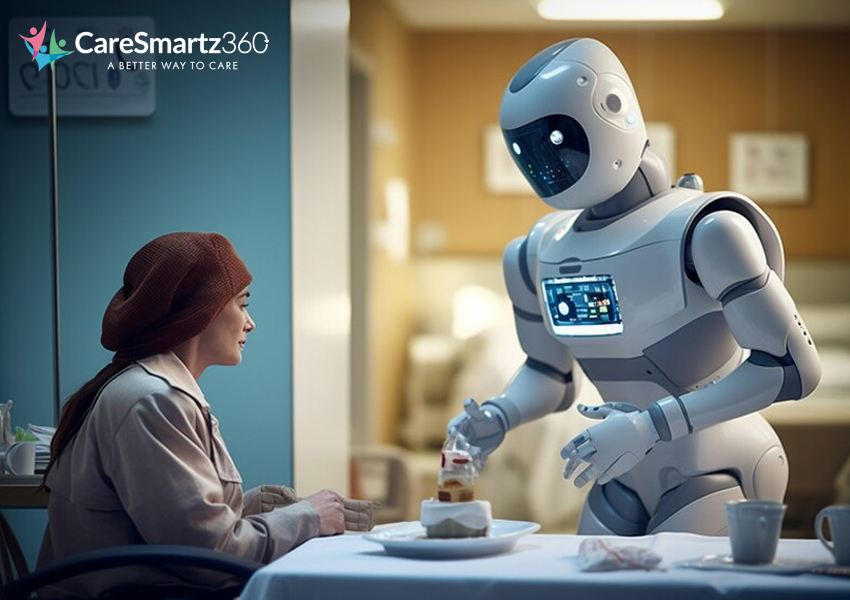AI in Home Care: Building Trust Through Data Security & Privacy

In technological evolution, the emergence of Artificial Intelligence marks a paradigm shift in modern innovation. Powered by the ability to process vast datasets, single out complex patterns, and implement decisions with razor-sharp precision, AI has brought about a whole new era of ingenuity and efficiency.
This blog delves into the importance of building trust in AI in home care via data security and privacy. It focuses on the need for robust ethical guidelines and regulatory frameworks to minimize risks, ensure the best use of home care client management software, and protect elderly rights.
Read on to learn the challenges in the AI era and which frameworks and strategies to adopt to combat these critical issues. But first, let us talk about:
- Top 3 AI Applications In Home Care
The growing elderly population is putting a strain on caregivers. Elderly care, chronic condition management, and long-term care are becoming daunting and expensive home care challenges.
The problem will only increase in the years ahead as the population ages.
In the U.S. alone, the number of Americans above 65 years is expected to double from 50 million today to nearly 100 million by 2060.
– HomeCare Magazine
But the good news is that AI is well-positioned to alleviate the coming staffing crisis in senior home care. For example, conversational AI devices that can have personal conversations with people have shown to improve the quality of life and mental health of seniors living alone.
Here are the other applications:
- Remote Patient Monitoring
Using AI-powered wearables, caregivers can provide reminders and interventions in real time to prevent health issues and detect conditions before they get worse.
Caregivers continuously capture and analyze older adults’ health metrics via remote monitoring, and can see changes in activity and behavior patterns.
It can help the elderly prevent potential problems related to diabetes, heart failure, Chronic Obstructive Pulmonary Disease, and even COVID-19.
- Virtual Home Care Assistants
AI-powered virtual caregivers for seniors, which are available 24/7, can make calls to (and get calls from) a large population of the elderly easily to see if they are feeling well, taking their medications, and if they have any questions about their care, freeing up valuable clinical resources.
If the seniors need help, they can be routed to their physician or other resource, services, or a loved one—without human intervention.
- Digital Companionship
Loneliness is an under-emphasized threat to seniors’ health and overall well-being. The problem is especially grave among older Americans.
AI-powered chatbots can address social isolation in home care environments. These chatbots, which use conversational voice assistants, smart speakers, and algorithms based on advanced natural language processing can carry on a conversation naturally.
Further, these digital companions can also collect data on a senior’s emotional state, noting if they are in pain, or depressed, or not sleeping well, which indicates a more complex mental health condition.
Can Robots Become Caregivers? Exploring the Potential of AI Companions
Read Blog
- Remote Patient Monitoring
- How To Build Trust In AI?
Trust serves as the basis of AI’s integration into societal settings. It refers to the expectation that AI systems will operate ethically, reliably, and without undue bias, promoting a sense of confidence among users.
Trust in AI depends on transparency and accountability, ensuring that AI technologies are effective and perceived as equitable and just.
I. Transparency means the operations of AI systems are open to inspection, while explainability refers to the ability to easily describe how the systems make decisions.
- Addressing Bias And Fairness
Instances of bias in facial recognition technology have raised public concern over the fairness of AI decisions. Mitigating bias requires a comprehensive approach, starting with diversifying training data and conducting regular audits for bias and discrimination in AI systems.
II. Security of AI in home care means the necessity to protect these technologies from cyber threats and to prevent their exploitation for malicious purposes.
The double-sided challenge here involves protecting the AI infrastructure from external attacks while ensuring the AI itself does not become a tool for harm.
- Protection From Cyber Threats
AI systems, especially those relying on machine learning (ML) algorithms, are prone to many cyber threats that can compromise their integrity and effectiveness.
These threats include:
- Data Poisoning
Malicious parties can manipulate the data used to train AI models, leading to compromised decision-making.
- Model Evasion
It includes manipulating input data so AI systems fail to detect malicious activities like malware or fraudulent transactions.
Implementing robust cybersecurity measures, such as secure ML practices, data encryption, and continuous monitoring of AI systems is crucial to counter these threats.
Further, adversarial training, where AI systems are trained on manipulated data to recognize and resist such attacks, can enhance their resilience.
III. Privacy concerns regarding AI in home care revolve around personal data that serves as the lifeblood of AI systems.
Ensuring the integrity and autonomy of individuals over their data is of critical importance. The tension between using data for AI advancements and preserving individual privacy rights requires a nuanced approach to ethical AI use.
- Data Poisoning
- Data Minimization And Anonymization
Data minimization is only collecting data necessary for a specific purpose. And anonymization techniques that remove personally identifiable information from datasets can further protect individual privacy.
- Regulatory Compliance And Best Practices
Regulations like the General Data Protection Regulation (GDPR) are setting standards for data protection and user consent. The GDPR mandates transparency in data processing and grants individuals rights over their data.
Conclusion
The future of AI is not pre-decided but shaped by our decisions in the future. The collaborative efforts of ethicists, technologists, policymakers, and the global community are vital to steer AI in home care toward a future that respects human rights, safeguards security, and upholds the principle of fairness.
Only by being ethically vigilant can we navigate the complexities of the AI era and embrace its transformative potential in home care software solutions. Meanwhile, we also need to remain steadfast in our commitment to the core values of trust, security, and privacy.

360॰ Security At CareSmartz360
CareSmartz360 keeps your agency data secure and guarded from third parties. We adopt a ‘security-first’ mentality and follow advanced data protection protocols and comprehensive risk management strategies to protect our clients’ data.
- Our platform offers you 24/7 software uptime that gives the edge.
- Our Disaster Recovery Plan reflects our promise of operational excellence and resilience.
- Our Security Operations Center (SOC) also operates 24/7. Download our Security Statement.
- CareSmartz360 security is managed by Microsoft Certified professionals.
Know More
Related blog posts:
Why is Data Security the Biggest Concern in Home Care?How AI Is Revolutionizing Home Care


